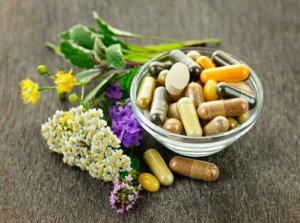Many people seek natural remedies for depression that is in the mild to moderate form. They do so for several different reasons including:
– Wanting a natural remedy as opposed to prescription drugs like antidepressant medications which are normally prescribed by a physician for the treatment of depression.
– The side effects or adverse reactions caused by the antidepressants most commonly prescribed for depression such as Paxil, Effexor and Lexapro.
– The ineffectiveness of antidepressant SSRIs – selective serotonin reuptake inhibitors – for some patients.
Consequently, natural remedies for depression are becoming increasingly popular as people discover more information about them from a number of news and community sources. As we learn more from people living with depression, it becomes clear that at least some of these remedies have the potential to help cure the effects of depression in some people.
These treatments consist of certain vitamins, herbs and other holistic forms of healing that are quickly becoming viable and effective alternatives to synthetic antidepressants and the unwanted side effects they produce.
The 15 Best Natural Remedies for Depression
While the effectiveness of many of these natural remedies have yet to be proven with scientific certainty through years of research, many people with mild or moderate depression do find great success using them.
Here are the 15 most popular ways to treat depression naturally without medication:
St. John’s Wort
St. John’s Wort contains compounds such as hyperforin and hypericin that are reported to relieve numerous health problems including anxiety and depression. Although research has yet to pinpoint exactly how St. John’s Wort helps reduce depression symptoms, some experts believe that these ingredients – particularly hyperforim – work in a manner similar to the way an SSRI works. In addition to adjusting levels of serotonin, hyperforin also targets glutamate and GABA, two other important neurotransmitters in the brain that affect mood.
Omega 3 Fatty Acids
Omega 3 is a fish oil compound also referred to as a polyunsaturated fatty acid. Walnuts, flaxseed and pumpkin seeds also contain small amounts of omega 3 but we primarily receive the most omega 3 fatty acids from eating fish or taking omega 3 supplements.
Researchers think that omega 3 provides depression relief due to the active ingredient EPA. Eicosapentaenoic acid appears to function as a calcium channel blocker in the brain, resembling the actions of mood stabilizers such as Lithium and Depakote. Calcium channel blockers are thought to not only be effective in reducing depression and anxiety but are also used to lower high blood pressure, regulate arrhythmic heartbeats and prevent migraines.
Magnesium
Studies indicate that people who are depressed have low levels of magnesium in their blood. More specifically, high levels of calcium coupled with insufficient magnesium are profusely evident in depressed individuals. Research involving subjects diagnosed with depression who take magnesium supplements experience a marked improvement in mood and anxiety levels.
Magnesium contributes to the optimal functioning of numerous bodily functions, such as conversion of fats, proteins and carbohydrates into energy, muscle relaxation (to prevent cramping and stiffness) and mental health. By playing a vital role in regulating the flow of calcium ions through neuronal calcium channels, magnesium has a direct impact on nitric oxide production, a chemical important brain health.
SAM-E – S-Adenosylmethionine
S-adenosylmethionine, what many people call SAM-E for short, is a naturally occurring chemical found in animal and plant cells that is responsible for ATP production, a substance necessary to maintain optimal cell functioning and growth. SAM-E is also a methylating agent required to maintain normal functioning of DNA, protein and other molecular processes in the brain. Deficiency in one or more of methyl group elements might cause depression as well as other cognitive diseases.
SAM-E targets the three main neurotransmitters involved in depressive illnesses –norepinephrine, dopamine and serotonin — by boosting and maintaining their levels in addition to stimulating production of glutathione, an antioxidant important to many brain mechanisms.
Vitamin B6
Because B6 might aid in the manufacturing of serotonin, dopamine and norepinephrine, a deficiency of this vitamin might cause depression. This vitamin is not naturally created in the body and can only be obtained by eating foods containing B6 or taking supplements. Increasing consumption of chicken, potatoes, spinach, bananas, walnuts and tuna might help alleviate depression as well as anxiety and insomnia.
Vitamin D
Although the correlation between vitamin D and depression has yet to be statistically substantiated, some evidence exists that indicates a lack of vitamin D might contribute to depression.
 This hypothesis results from the production of vitamin D when skin is exposed to sunlight and from individuals suffering from SAD, or seasonal affective disorder. Many people become depressed during long, dark winter months and researchers suggests that this is the consequence of not receiving sufficient amounts of sunlight to create enough vitamin D. In addition, blood tests performed on those with SAD reveal that parathyroid hormone levels increase when vitamin D levels are low, which may also be a contributory factor in the development of depression.
This hypothesis results from the production of vitamin D when skin is exposed to sunlight and from individuals suffering from SAD, or seasonal affective disorder. Many people become depressed during long, dark winter months and researchers suggests that this is the consequence of not receiving sufficient amounts of sunlight to create enough vitamin D. In addition, blood tests performed on those with SAD reveal that parathyroid hormone levels increase when vitamin D levels are low, which may also be a contributory factor in the development of depression.
Folic Acid
Crucial to healthy functioning of the brain, RNA and DNA production, fetal growth and red cell formation, folic acid deficiencies can not only cause depression but also memory problems, gastrointestinal problems, anxiety and even poor oral health. Research into the mechanism of action for folic acid shows that it behaves like SAM-E, positively affecting brain methylation and stimulating monoamine metabolism that works to inhibit depression symptoms by elevating neurotransmitter levels in the brain.
Magnolia Bark
Magnolia bark is an herb used in Chinese traditional medicine containing eudesmol and biphenols effective in neurotransmitter regulation and treating depression. Magnolia bark is also an antioxidant that eases inflammation and desensitizes nerve endings to pain.
Saffron
Saffron is a Middle Eastern spice used to enhance a variety of foods but also seems to successfully treat depression. Two active chemicals found in saffron called safranal and crocin function like synthetic antidepressants by increasing serotonin levels in the brain. A few studies suggest that saffron might also contain memory-enhancing and anti-carcinogenic properties. Herbal supplements of saffron usually consist of 30 milligram capsules taken daily.
L-Tryosine and 5 HTP
Gaining popularity for depression relief, L-Tryosine and 5 HTP are precursors to neurotransmitters important in mood regulation. While L-tyrosine constitutes most of the catecholamines such as epinephrine, norepinephrine and dopamine, 5 HTP activates serotonin production. By boosting levels of all these neurotransmitters, individuals suffering depression may experience rapid relief from sadness, lethargy and hopelessness.
Melatonin
Melatonin supplements may help those who become depressed during the winter. Researchers think this disorder known as SAD, or seasonal affective disorder, might be the result of delayed or insufficient release of melatonin within the brain. People with SAD are extremely sensitive to the absence of light. Without light, their circadian rhythm is interrupted which causes serious problems with sleep patterns. Sleep disruption contributes to depression as well as to physical conditions associated with depression. When taking melatonin supplements for depression, patients may have to experiment with ingestion times, as some do better when taking melatonin later in the afternoon rather than first thing in the morning.
Nutrition and Diet
The beneficial effects of good nutrition and diets rich with fresh fruits and vegetables daily cannot be emphasized enough in regards to countering the debilitating effects of depression. In addition to maintaining sufficient amounts of vitamins, minerals and amino acids by eating nutritional foods, people who exercise enable release of “feel-good” neurotransmitters that include endorphins as well as serotonin, norepinephrine and dopamine.
Exercise
Many doctors and medical experts believe state that when exercise causes a mild to moderate rise in body temperature, this appears to produce a calming effect on people who are experiencing anxiety, a symptom often accompanying depression.
Light Therapy
Light therapy, or phototherapy, is especially effective for those suffering from SAD. Patients sit under a light that mimics sunlight for about 30 minutes daily to increase production of vitamin D. This “light therapy box” is also used to treat other forms of depression as well as sleep disorders caused by delayed release of melatonin.
 While there is no question that the decision to treat depression naturally is a personal one, before you self treat with one of these natural remedies, please check with your physician. Your depression could be caused by physical related reasons that might require medical treatment. Further, it is recommended that if a person has severe depression he or she should seek advice and treatment from his or her doctor or medical health care professional.
While there is no question that the decision to treat depression naturally is a personal one, before you self treat with one of these natural remedies, please check with your physician. Your depression could be caused by physical related reasons that might require medical treatment. Further, it is recommended that if a person has severe depression he or she should seek advice and treatment from his or her doctor or medical health care professional.
While these treatments might be highly effective, some people might not receive the benefits that others do from implementing them. If the feeling of depression you or a family member experiences remains after trying several of these methods, contact your doctor immediately so clinical treatment with either talk therapy counseling and/or antidepressants can be started. The risks of untreated depression include worsening of symptoms, development of serious physical medical conditions and detrimental disruption the quality of life.
Interested in reading more about natural remedies for depression? Check out the related posts below.
Related Posts



